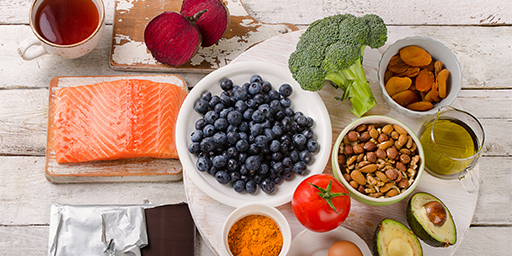Superfoods and their health benefits

Superfoods. We hear about them in the news, but let’s face it, no one can ever agree on what the top fifteen are, let alone the top five. Do they even work? How do we sort out fact from hype? The short answer is yes, they do work, to a certain degree. They are not a cure-all, but they will definitely make you feel better and be healthier overall. But what is fact and what is myth? Here is where things get tricky. In this article, we will look at superfoods and determine what the facts about them really are.
What are superfoods?
So, what is a superfood? According to Health Magazine, superfoods are nutrient dense foods that have a lot of vitamins, minerals, and antioxidants or polyphenols. What makes things confusing is that there is no formal definition of the word, but Health’s definition is similar to what other organizations use as their definition. Which foods are superfoods? And, does anyone agree on what a superfood is?
beans
berries
black beans
blueberries
broccoli
eggs
kale
kiwis
nuts
oats
quinoa
salmon
sweet potatoes
tomatoes
yogurt
All of the foods you see listed are healthy for you, providing you rare nutrients like lycopene that help lower cholesterol, vitamins, phytonutrients that help reduce free radicals in the body that increase the rate of aging, healthy proteins and fats, fiber, omega-3 fatty acids for reducing inflammation, probiotics, and compounds that may help fight cancer cells. The key word in that last part – “may”. A good diet will give the immune system a boost since it does not have to fight internal inflammation at the same time as the disease.
Now, there are those who will say that XYZ is the newest rage, and you simply have to eat this food because it will cure every disease and make your hair grow back. This is when the hype takes over and it is time to take a step back for a moment to do some research into the food and what its nutrients can do for you. As we will soon see, good can come of eating right, but you have to do your research well and find out the truth.
Why do superfoods matter?
The modern western diet is full of fats, salt, and sugar, and it is low in nutrition. As a result, our bodies are paying the price for them.
- Metabolic disorders like high blood pressure, diabetes, arthritis, and obesity are all linked to the western diet, while people in Greece and Japan are more likely to be free of these issues based on their diets which feature a lot of fish, grains, and healthy fats, items you see appearing in the superfoods lists.
- Can we turn our health problems around? Absolutely. Changing our diets and focusing on balanced nutrition gets us a great start, and topping the plan with exercise will promote long-term health changes.
If you have doubts about what a food can do, check the long-standing research done on the foods and find out what actual healthy components it has. Use sources like respected news organizations, or better yet, research hospital publications. This will help you separate hype from fact. The foods in the tables above have passed the test of time and have proven to be healthy additions to your diet.
The Huffington Post stated that some ideas now in the superfoods movement have been discussed and researched for a long time – whole grains, vegetables and fruits, seeds, legumes, and nuts. Produce with bright colors is hailed for its health value. High fat saturated red meats, fried foods, foods coated with pesticides, and heavily processed foods are to be avoided because of their artery clogging saturated fats and toxins.
Adding some thinking to the hype –
You should temper the superfoods hype with some moderation. No food can cure everything. Superfoods are not superheroes that will swoop in and magically erase all of the damage from the hamburgers you ate in college. London’s Metro News reported on a study that showed 61% of people surveyed purchased and consumed foods because they thought them to be superfoods, and 38% in that study thought these foods conveyed extra health benefits beyond being part of a healthy diet.
Some British health experts, like Christina Merryfield of Cromwell Hospital, said in the Metro Newsthat bad food habits could not be undone by eating superfoods, and they should not be used to replace items in the daily diet. This has a bit of merit, if taken to mean that superfoods cannot cancel out a super meat pizza with extra cheese. It also means to not interpret the superfoods as being complete nutrition.
What superfoods cando, and how they should be used, is as a one-for-one replacement in the diet.
- Remove the pizza; add in a massaged kale salad with shredded carrots and an olive oil-based vinaigrette with a grilled salmon filet.
- Incorporate superfoods into your life as part of a balanced diet, and put several of them together to get all of the nutrients you need.
Zoe Harcombe, British nutritionist, also said in the Metro News that a healthful diet can be boosted by avoiding things that cause oxidation in the body in the first place, like pollution, processed foods, and cigarettes.
Conclusion –
Making superfoods a part of your diet is never going to be harmful. Switching out the damaging foods from the western diet and adding in foods that are known to have health benefits, exercising, and taking a multivitamin to fill in any nutritional gaps will make you feel better. Do some digging around to find out what nutrients are actually in the food, and be skeptical of the hype around a particular food. Some critical thinking is always a good thing.
As an Amazon Associate I earn from qualifying purchases.
Categories: Articles
Sorry, comments are closed for this item.
